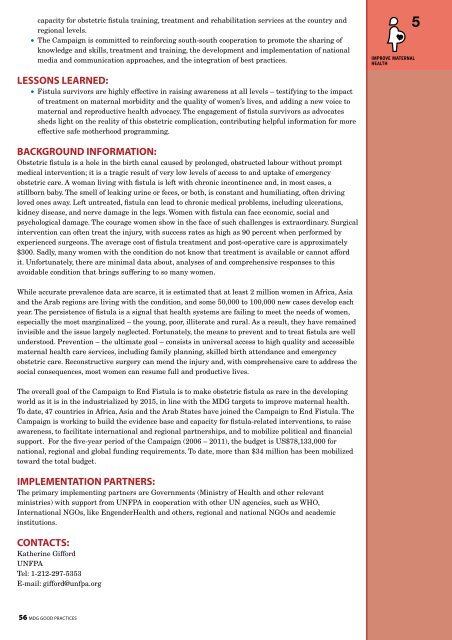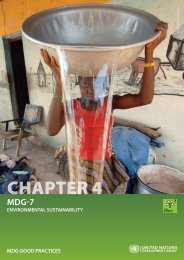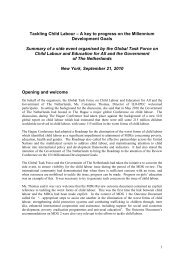Download - United Nations in Cambodia
Download - United Nations in Cambodia
Download - United Nations in Cambodia
Create successful ePaper yourself
Turn your PDF publications into a flip-book with our unique Google optimized e-Paper software.
capacity for obstetric fistula tra<strong>in</strong><strong>in</strong>g, treatment and rehabilitation services at the country and<br />
regional levels.<br />
• The Campaign is committed to re<strong>in</strong>forc<strong>in</strong>g south-south cooperation to promote the shar<strong>in</strong>g of<br />
knowledge and skills, treatment and tra<strong>in</strong><strong>in</strong>g, the development and implementation of national<br />
media and communication approaches, and the <strong>in</strong>tegration of best practices.<br />
Lessons Learned:<br />
• Fistula survivors are highly effective <strong>in</strong> rais<strong>in</strong>g awareness at all levels – testify<strong>in</strong>g to the impact<br />
of treatment on maternal morbidity and the quality of women’s lives, and add<strong>in</strong>g a new voice to<br />
maternal and reproductive health advocacy. The engagement of fistula survivors as advocates<br />
sheds light on the reality of this obstetric complication, contribut<strong>in</strong>g helpful <strong>in</strong>formation for more<br />
effective safe motherhood programm<strong>in</strong>g.<br />
Background Information:<br />
Obstetric fistula is a hole <strong>in</strong> the birth canal caused by prolonged, obstructed labour without prompt<br />
medical <strong>in</strong>tervention; it is a tragic result of very low levels of access to and uptake of emergency<br />
obstetric care. A woman liv<strong>in</strong>g with fistula is left with chronic <strong>in</strong>cont<strong>in</strong>ence and, <strong>in</strong> most cases, a<br />
stillborn baby. The smell of leak<strong>in</strong>g ur<strong>in</strong>e or feces, or both, is constant and humiliat<strong>in</strong>g, often driv<strong>in</strong>g<br />
loved ones away. Left untreated, fistula can lead to chronic medical problems, <strong>in</strong>clud<strong>in</strong>g ulcerations,<br />
kidney disease, and nerve damage <strong>in</strong> the legs. Women with fistula can face economic, social and<br />
psychological damage. The courage women show <strong>in</strong> the face of such challenges is extraord<strong>in</strong>ary. Surgical<br />
<strong>in</strong>tervention can often treat the <strong>in</strong>jury, with success rates as high as 90 percent when performed by<br />
experienced surgeons. The average cost of fistula treatment and post-operative care is approximately<br />
$300. Sadly, many women with the condition do not know that treatment is available or cannot afford<br />
it. Unfortunately, there are m<strong>in</strong>imal data about, analyses of and comprehensive responses to this<br />
avoidable condition that br<strong>in</strong>gs suffer<strong>in</strong>g to so many women.<br />
While accurate prevalence data are scarce, it is estimated that at least 2 million women <strong>in</strong> Africa, Asia<br />
and the Arab regions are liv<strong>in</strong>g with the condition, and some 50,000 to 100,000 new cases develop each<br />
year. The persistence of fistula is a signal that health systems are fail<strong>in</strong>g to meet the needs of women,<br />
especially the most marg<strong>in</strong>alized – the young, poor, illiterate and rural. As a result, they have rema<strong>in</strong>ed<br />
<strong>in</strong>visible and the issue largely neglected. Fortunately, the means to prevent and to treat fistula are well<br />
understood. Prevention – the ultimate goal – consists <strong>in</strong> universal access to high quality and accessible<br />
maternal health care services, <strong>in</strong>clud<strong>in</strong>g family plann<strong>in</strong>g, skilled birth attendance and emergency<br />
obstetric care. Reconstructive surgery can mend the <strong>in</strong>jury and, with comprehensive care to address the<br />
social consequences, most women can resume full and productive lives.<br />
The overall goal of the Campaign to End Fistula is to make obstetric fistula as rare <strong>in</strong> the develop<strong>in</strong>g<br />
world as it is <strong>in</strong> the <strong>in</strong>dustrialized by 2015, <strong>in</strong> l<strong>in</strong>e with the MDG targets to improve maternal health.<br />
To date, 47 countries <strong>in</strong> Africa, Asia and the Arab States have jo<strong>in</strong>ed the Campaign to End Fistula. The<br />
Campaign is work<strong>in</strong>g to build the evidence base and capacity for fistula-related <strong>in</strong>terventions, to raise<br />
awareness, to facilitate <strong>in</strong>ternational and regional partnerships, and to mobilize political and f<strong>in</strong>ancial<br />
support. For the five-year period of the Campaign (2006 – 2011), the budget is US$78,133,000 for<br />
national, regional and global fund<strong>in</strong>g requirements. To date, more than $34 million has been mobilized<br />
toward the total budget.<br />
Implementation Partners:<br />
The primary implement<strong>in</strong>g partners are Governments (M<strong>in</strong>istry of Health and other relevant<br />
m<strong>in</strong>istries) with support from UNFPA <strong>in</strong> cooperation with other UN agencies, such as WHO,<br />
International NGOs, like EngenderHealth and others, regional and national NGOs and academic<br />
<strong>in</strong>stitutions.<br />
Contacts:<br />
Kather<strong>in</strong>e Gifford<br />
UNFPA<br />
Tel: 1-212-297-5353<br />
E-mail: gifford@unfpa.org<br />
56 MDG Good Practices








